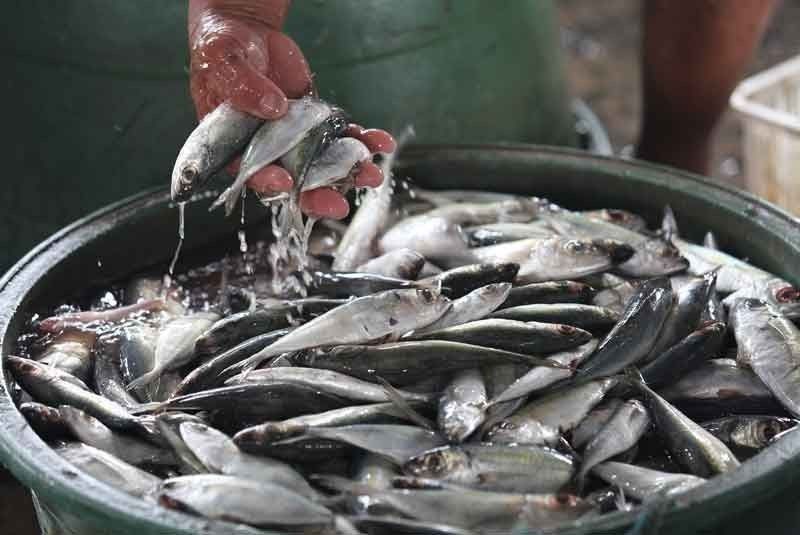Here's why the Philippines is importing galunggong and why it matters

MANILA, Philippines — Agriculture Secretary William Dar last week signed off on the importation of 45,000 metric tons of fish, including galunggong (round scad), in a bid to stabilize high market prices amid low supply.
This prompted fishers group Pamalakaya (Pambansang Lakas ng Kilusang Mamamalakaya ng Pilipinas) and others to protest the importation order, saying it will hurt the livelihood of small fishers and will not do much to stabilize market prices.
Is the bulk import of galunggong and other fish indeed necessary?
Here’s what we found.
Declining supply
Bureau of Fisheries and Aquatic Resources Director Eduardo Gongona in January said during the country’s first Galunggong Summit that the drop in production of round scad means “the country will not be able to satisfactorily meet the demand for fish and follow through with its food fish sufficiency goals.”
“This also means heavy losses for the Philippine fishing industry as galunggong is also a source of livelihood for small-scale fisherfolk, commercial fishing operators, and other stakeholders across the fisheries sector,” Gongona said.
The volume of galunggong production in the country has been sharply declining for the past decade, according to data from the Philippine Statistics Authority.
From almost 300,000 metric tons of galunggong collectively produced by commercial fisheries and municipal fisheries in 2008, the Philippines only turned up a little bit over 170,000 metric tons of the fish species last year.
The value of galunggong peaked at around P16.47 billion in 2013, which saw relatively high production of about 270,000 metric tons of round scad. Since then, the value of the commodity has dropped by billions of pesos along with the production decline.
Flying fish costs
The average retail price of galunggong has also been increasing alongside declining production and value.
Dubbed the poor man’s fish, a kilogram of galunggong used to cost around P80. However, PSA data show that the average retail price of the fish swam up by P60 per kilogram over the past decade.
In 2019, the average retail price of galunggong in the country remained over P140 per kilogram.
The situation only worsened towards year’s end as market prices of galunggong in Metro Manila skyrocketed around late November and early December.
The price of a kilogram of galunggong, about 12 to 14 pieces, peaked at P380 last weekend in Metro Manila. The latest price monitoring by the PSA also shows the prevailing or usual market price at P300.
Last year, the Philippines imported 17,000 metric tons of galunggong from Vietnam, Taiwan, and China.
Then Agriculture Secretary Emmanuel Piñol said this was necessary to preempt a price increase and boost local supplies once the annual three-month closed fishing season takes effect.
The yearly closed fishing season for galunggong has been implemented since 2014.
Closed Fishing Season
"For Metro Manila, an initial 17,000 metric tons of galunggong from Vietnam, Taiwan, and China is expected to be imported by fisheries stakeholders, including fishing boat operators, who will hang their nets during the closed fishing season, and organized fish vendors associations," Piñol’s Facebook post dated August 2018 read.
“The Closed Fishing Season is strictly implemented in the different fishing grounds of the country to protect food security fish species like Tamban, Galunggong, Mackerel, and others to spawn and reproduce.”
Importing is ‘band-aid solution’
However, lawmakers and fisherflk alike have said that importing galunggong is no solution to rising fish prices.
Rep. Lito Atienza (Buhay party-list) in August 2018 said the more cost-effective approach is to improve fish production.
"It is a band-aid solution that does not really address the problem of falling fish production," Atienza said, referring to the DA’s decision to import 17,000 metric tons of galunggong.
"It is a miserable supply-side intervention...The best way for the government to fight off rising fish or food prices for that matter is by enabling the production of more fish and more food."
The lawmaker instead suggested the temporary closure of municipal waters around Luzon for rehabilitation in order to allow the fish to repopulate.
“We cannot expect fish and other marine life to thrive abundantly in our highly toxic municipal waters,” Atienza said then.
Party-list Rep. Ariel Casilao (Anakpawis) said it was the Agriculture department’s mandate to support local fishermen through means like providing proper fishing equipment, subsidies, and other services that would boost their catch and income.
Villar: Importation should not be automatic reaction
Sen. Cynthia Villar at the time also said the DA should reconsider its importation policy as it would adversely affect the livelihood of small fishers and farmers.
"Importation should not be our automatic reaction to problems besetting the agriculture sector. We should work for long-term solutions that will make us self-sufficient and competitive," Villar said in a statement.
The senator also recommended the imposition of a price ceiling to curb the rise in prices of food items, as well as the government finding an alternative source of income for those affected by the closing of fishing grounds.
The Center for Strategic Planning and Policy Studies also published a 2017 paper that focused on sardines, but recommended future studies on the closed season policy's effects on other fish stocks and fishery resources, as well as possible "spill-over effects.”
“Continuous socio-economic research should assess situation of fishers, and the impact of the policy on their livelihood,” the paper read.
“Major stakeholders like fishers and workers who will be directly affected by regulations like the closed season policy should be consulted at the beginning so that its negative
impact, such as loss of job during the closed season period, should be respondedmproperly not only by the local government units but also by the different national government agencies,” the report also said.
Galunggong’s value
While Villar has opposed the importation of galunggong, she was also recently hit by activist groups and social media users over her remark for people to just eat something else if round scad is too expensive.
The Senate Committee on Agriculture, Food, and Agrarian Reform chair told reporters on Tuesday that Filipinos shouldn’t complain about skyrocketing galunggong prices since there are healthier and cheaper alternatives available.
“Bakit ba patay na patay tayo? Mahal na ang galunggong...Kumain ng other means which are cheaper and available. Dami namang choices, bakit ba ini-insist 'yan?"
(Why are you we so obsessed with it? Galunggong is expensive, just eat other means which are cheaper and available. There are a lot of choices, why insist on it?)
Farmers and fishers groups on Wednesday said that Villar’s comment fails to consider the limited food options that poor Filipinos have.
Zenaida Soriano, national chairperson of National Federation of Peasant Women (Amihan), said the senator is blind to social realities like high prices of food items other than galunggong, like rice and vegetables.
"Walang karapatan si Villar magdikta sa tao kung ano ang kakainin, at trabaho nga niya na gawing accessible sa mahihirap ang mga food items," Soriano said in a statement.
(Villar has no right to tell people what to eat, her job is to make food items accessible to the poor)
Pamalakaya, meanwhile, said that Villar's comment is "irresponsible" given her position, which allows her to probe the alleged shortage of galunggong and if it's necessary to import the commodity.
“We remind Senator Villar that she is duty-bound to ensure that there is stable and affordable supply of agricultural and fishery products in the market,” Pamalakaya national chairperson Fernando Hicap said in a statement.
The group trooped to the Department of Agriculture on Monday to protest the importation of galunggong.
Pamalakaya said, however, that aside from negatively affecting the livelihood of small fishers, the bulk importation also would not guarantee that prices in the market would normalize as private traders maintain market prices "far higher than the farm gate value."
“Our call to cancel the importation order is directed not only to the DA and BFAR, but to every concerned government official, most especially Senator Villar, who is in the right position to investigate and resolve this agricultural crisis,” Hicap said.
- Latest
- Trending





























